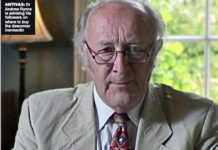By Michael O’Farrell
Investigations Editor
DECEMBER 4 was just like any other Friday night for Mandy Murphy and her only daughter Alisha.
With a box of treats, the pair snuggled into the living room sofa in their Drogheda home to watch the final of I’m A Celebrity Get Me Out Of Here.
As usual, Mandy nodded off on the couch. ‘Mammy you’ve done it again. You’ve fallen asleep,’ Alisha teased as she headed up to bed.
‘Goodnight Mam. Love you. See you in the morning.’ Those were the last words Mandy will ever hear from her daughter.
At 9.30 the following morning Mandy went into her daughter’s room.
‘She has a bearded dragon [a pet lizard] and I went up to turn his lights on.’ But something seemed off. Mandy’s heart skipped a beat. She called out Alisha’s name.
‘I called her three times and I knew after the third time there was something wrong with my baby, and I shook her and she just wouldn’t wake up.’
Then panic. Mandy called Alisha’s father Noel Crosbie who lives in Balbriggan. The line was muffled as Mandy frantically sought any signs of life.
‘I think she’s dead,’ she told Noel who told her to hang up and call an ambulance.
Frantic and unable to get through on the phone any more, Noel hailed a taxi. He knew where he had to be. He learned his daughter was gone for sure as he sat helplessly in the back of the car speeding north on the M1 motorway.
Mandy, meanwhile, with the help of a neighbour, had been desperately trying to revive her daughter with a 999 call-taker on the other end of the line and an ambulance on its way.
When Noel arrived in Drogheda he encountered a nightmarish scene.
‘It was all chaos. Ambulance crew. Guards upstairs. Everybody was upstairs. She wasn’t cordoned off or anything. They were letting people into the room – friends – and her lying in the bedroom dead. Her best friend, Nicole, she was desperate to go up and see her so the gardaí let her up and into the room.’
Alisha, who was just 19, had shown no sign of illness at all before she died in her sleep. She had been in the form of her life. Someone – a member of the emergency services – mentioned sudden adult death syndrome. Every parent’s worst nightmare.
But the nightmare was about to get worse. Horribly so.
Alisha was brought to the mortuary at Drogheda hospital. The funeral directors told Noel a Covid-19 test would ensue immediately – a mandatory procedure with all unexplained deaths.
In the meantime, no one could go near the body.
‘We couldn’t get Alisha released until it came back negative,’ said Noel.
For reasons yet to be explained, the Covid test was not carried out until Monday – two days after the death.
The result came through on Tuesday. Alisha was Covid-positive. The funeral director – not the HSE – told Mandy and Noel of the positive result.
Their GP then called to explain that their daughter could not come home and would have to be brought to Dublin for an autopsy.
No one in the HSE had yet contacted Mandy or Noel, who organised their own Covid tests through their GP. The results came back negative 49 hours later.
The next day the HSE – apparently unaware that Mandy and Noel had tested clear – called to say tests were being booked for them.
Meanwhile, a CT scan in Dublin confirmed Covid-active pneumonia in Alicia’s lungs.
Shocked and stunned at the formal diagnosis, Mandy and Noel couldn’t believe what they were hearing. They still can’t believe it.
‘She had so much living to do,’ says Noel.
‘She wasn’t ready to go yet.’ ‘She had so much ahead of her and she was just taken from us like that. She was our one and only – everything we did was for her and now it’s gone.’
Noel refuses to allow his daughter – who would be the youngest-known Covid fatality in Ireland to date – to become another pandemic statistic.
‘Our child did not die of Covid and she will not be put down as a Covid death,’ he repeats forcefully.
‘She wasn’t sick and she hadn’t got pneumonia. If she had pneumonia, she would have been rattling here.
Did you ever hear of pneumonia killing you in your sleep? There was not a bother on her. She was singing and dancing. She hadn’t got any cold or anything. Not a sniffle.’
In calmer moments he is more open to the possibility of his daughter having Covid.
‘If she died of Covid in the lungs, and if they physically prove it to me, I’ll accept it but until then I’m not accepting it.’ He also wants to know if the same rare heart problem that took his brother’s life at a young age could be at play.
But, mostly, he just can’t believe his child is dead – never mind the reasons for it. He doesn’t want his daughter to be used to instil fear into other young people.
A bitter irony, that is not lost on Noel, is how careful Alisha was during the pandemic. She would have been first in line to volunteer for a vaccine jab.
‘She was a stickler for sticking to the rules. She wouldn’t even let her Mam give her a kiss since Covid started. She wouldn’t go anywhere without a mask.’
‘I have not got a kiss off my daughter because of Covid,’ says Mandy between anguished sobs of grief. ‘I don’t know where she got Covid. None of us have Covid.’
In their grief, Mandy and Noel are angry at the way the HSE dealt with their daughter’s death.
Although she was 19, Alisha, who attended St Ita’s school for those with mild learning disabilities, suffered from dyspraxia and retained a magical child-like innocence. Her dream was to open a dog-grooming business and she was hatching plans to move into an assisted living apartment with her best friend.
Because of her disability, Alisha had never spent more than two nights away from her mother – and that only happened once because she won a prize for raising calves at St Ita’s that involved a trip to Amsterdam.
Otherwise, mother and daughter, who went to see Olly Murs together before the pandemic, were inseparable. But after her death, Alisha’s parents were denied access to their child for a week and were lucky to see her again – a blessing denied to most Covid-hit families.
‘They took her away from us on a Saturday when she passed away and we didn’t see her until the following Saturday,’ said Noel.
‘A whole week they had her and we couldn’t get near her and couldn’t do anything. We didn’t know where the poor girl was.’ Noel is particularly angry at how difficult it was to even get his daughter home – something virtually all families afflicted by Covid deaths have been denied.
‘The HSE took over. They just took over the funeral and that was the end of us doing anything with Alisha. They stopped the priest coming up to us. The priest was told not to come to our house.
‘It was a nightmare. They put us through hell and we’re still trying to grieve our daughter. I don’t know how we’re going to deal with this. We can’t even get our head around the fact that she’s gone.’
But Alisha’s family kept fighting to see her. ‘Anyone else with Covid there’s a five-minute burial and they’re in the ground and that’s it,’ says Noel.
Alisha’s family were never going to accept that for their daughter and somehow they prevailed.
‘We phoned everyone we could in the HSE and we couldn’t get answers. We were passed from pillar to post. All we did from the time she left until the time she came home was get on to the HSE and we couldn’t get a proper answer. Where our daughter was. When could we get her back.’
A week after Alisha’s death the funeral director rang to say she could come home.
‘The funeral directors said that because she was embalmed she wasn’t any threat to the public,’ says Mandy.
‘The only threat would be someone coming in with it and touching her and then someone else coming in and touching her – and they get it.’
It wasn’t the wake her parents would have wanted, but they were able to bring Alisha home one last time. She spent most of last weekend laid out in her open, white coffin in the family living room before being buried on Monday.
Alisha’s parents asked mourners to wear Christmas jumpers to the service.
The funeral director told Noel his daughter was the ‘first of her kind’ and that everyone was still learning about how to deal with Covid deaths.
Now, having seen what a Covid death does to the grieving process, Noel wants answers.
‘Why aren’t they embalming everyone and letting them home to their families? Why aren’t they doing that and letting people have their loved ones for a weekend to say goodbye to them? If they can do that for Alisha, why can’t they do it for everybody else? Why can’t they let their family have a bit of time with them before they bury them?’
Should that happen now, Noel would like to think it’s because of his daughter and her family’s fight to get her home. ‘Alisha might still do some good in the world. She might force some change in the HSE.’
The HSE did not respond to an MoS request for comment.
For now though, Noel just wants to get beyond the anger he feels.
‘We were so angry all week we couldn’t even cry and we still can’t get the tears out now. It’s a different world out there from when we went to bed that Friday. It hasn’t been the same since. Empty and lonely. It’s still so raw.’
Alisha would rise each morning with her beloved Jack Russell Rocco and turn on her music as she ate breakfast.
‘Music has always been her thing,’ says Mandy. ‘I can’t turn it on now.’
‘Yeah,’ says Noel. ‘We’re sitting here in silence.’
Behind him, on the mantelpiece, Alisha’s red Christmas stocking hangs limp and forlorn with her name stitched in white letters.
Outside the back door, banished to the yard, Rocco won’t stop barking, waiting for Alisha to come home.



